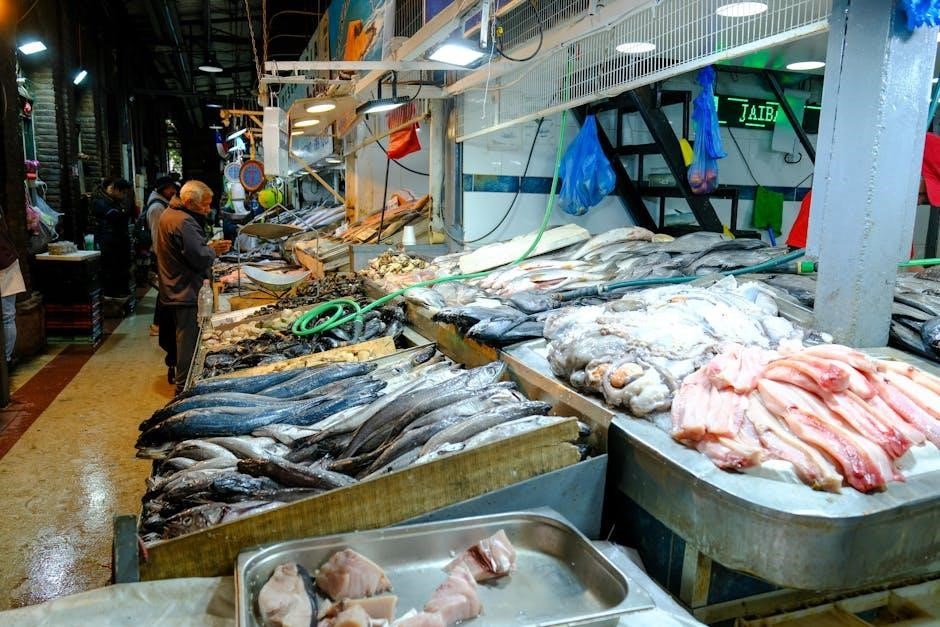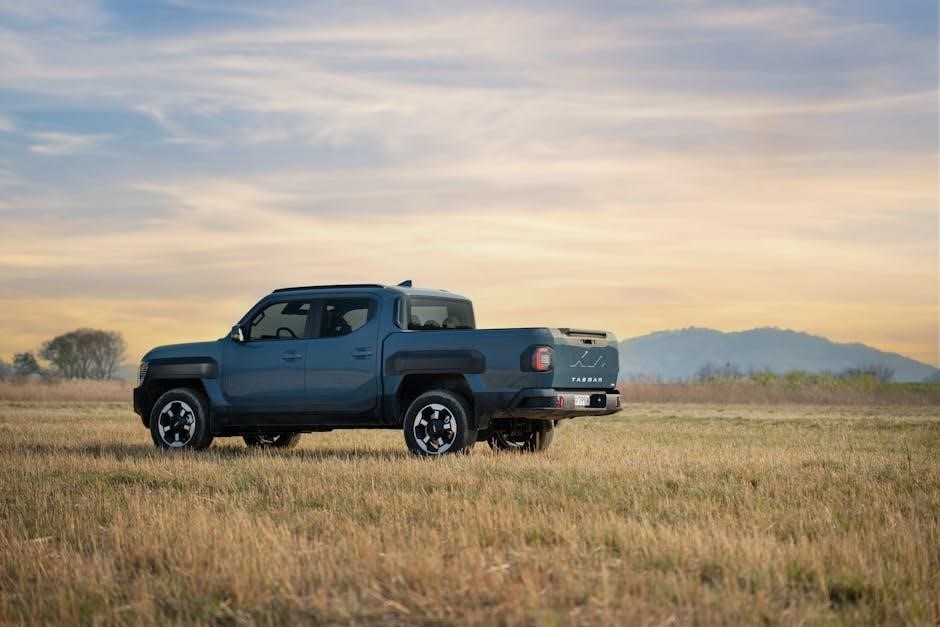Commercial truck insurance is essential for protecting business assets, including vehicles, drivers, and cargo. It ensures legal compliance and provides financial security against accidents and unforeseen events.
Why Commercial Truck Insurance is Essential
Commercial truck insurance is vital for protecting businesses from financial losses due to accidents, cargo damage, or liability claims. It ensures legal compliance, covers medical expenses, and safeguards assets. Without proper coverage, trucking companies risk severe financial repercussions, making insurance indispensable for operational security and peace of mind.
Overview of the Guide
This guide provides a comprehensive overview of commercial truck insurance, covering key aspects such as types of coverage, cost factors, legal requirements, and policy selection. It offers insights into risk management, essential coverage areas, and strategies to obtain the best insurance quotes, ensuring businesses make informed decisions to protect their assets effectively.

Understanding Commercial Truck Insurance
Commercial truck insurance is specialized coverage for business vehicles, protecting against accidents, liability, and cargo damage, tailored to meet the unique needs of trucking operations.
Definition and Purpose
Commercial truck insurance is a specialized policy designed to protect business vehicles, such as semi-trucks, box trucks, and dump trucks, from risks like accidents, liability, and cargo damage. Its primary purpose is to provide financial protection, ensure legal compliance, and safeguard business assets, making it essential for trucking companies and owner-operators to operate securely and responsibly.
Types of Commercial Trucks Covered
Commercial truck insurance covers a variety of vehicles, including semi-trucks, box trucks, dump trucks, and tow trucks. These policies also extend to flatbed trucks, refrigerated trucks, and other specialized vehicles used for business purposes. Coverage is tailored to protect both the vehicle and its cargo, ensuring comprehensive protection for diverse business needs and operational requirements.
Key Coverage Areas
Commercial truck insurance typically covers liability for accidents, damage to the vehicle, and cargo protection. Policies may also include coverage for uninsured motorists, medical expenses, and theft. Additional options often extend to equipment, towing, and rental reimbursement, ensuring comprehensive protection for various risks associated with commercial trucking operations and business continuity.
Factors Influencing the Cost of Commercial Truck Insurance
Vehicle type, value, driving records, and location significantly impact premiums. Safety history, fleet size, and operating radius also play crucial roles in determining insurance costs.
Vehicle Type and Value
The type and value of your commercial truck significantly influence insurance costs. Heavier vehicles, such as semi-trucks, often require higher premiums due to greater potential damage and liability risks. Specialized trucks, like dump trucks or tow trucks, may also incur higher rates. The truck’s value determines the extent of coverage needed, with more expensive vehicles requiring increased protection to cover repair or replacement costs.
Driving Record and Safety History
A clean driving record and strong safety history can significantly lower commercial truck insurance premiums. Insurance companies view drivers with fewer accidents or violations as lower risks. Implementing safety measures, such as driver training programs or installing safety technology, can also reduce costs. A history of claims or safety violations, however, may lead to higher premiums to account for increased risk exposure.
Location and Operating Radius
Location and operating radius influence commercial truck insurance costs. Trucks operating in high-risk areas or long-distance routes face higher premiums due to increased exposure to accidents. Urban areas with heavy traffic may cost more than rural regions. Additionally, crossing state lines or transporting goods internationally can require specific coverage, further impacting insurance rates and policy requirements.

Legal Requirements for Commercial Truck Insurance
Commercial truck insurance is mandated by federal and state regulations to ensure legal operation and financial protection for trucking businesses and drivers.
Federal and State Mandates
Federal regulations require commercial trucks to carry minimum liability insurance, particularly for vehicles transporting hazardous materials or crossing state lines. State laws further specify coverage amounts and additional requirements based on truck type and cargo. Compliance ensures legal operation and financial protection for trucking businesses and drivers across jurisdictions.
Minimum Liability Coverage Requirements
Commercial truck insurance policies must meet minimum liability coverage requirements, typically ranging from $750,000 to $1 million, depending on the type of cargo and truck weight. Federal regulations mandate higher coverage for hazardous materials, up to $5 million. These requirements ensure financial protection for third-party injuries or property damage, aligning with legal standards for trucking operations.
Additional Coverage Types
Beyond liability, additional coverage options enhance protection for trucking businesses. These include collision coverage for truck damage, comprehensive coverage for theft or vandalism, and cargo insurance to protect goods during transit. Unforeseen event coverage, such as natural disasters, can also be added for comprehensive financial protection, ensuring business continuity and minimizing potential losses.
Choosing the Right Insurance Policy
Selecting the right policy involves evaluating providers, comparing coverage options, and assessing costs to ensure comprehensive protection tailored to your business needs and budget constraints.
Evaluating Insurance Providers
Evaluating insurance providers involves researching their reputation, financial stability, and customer service. Compare coverage options, policy limits, and exclusions. Consider providers like Progressive and Berkshire Hathaway, known for competitive rates and tailored policies. Ensure the provider specializes in commercial truck insurance and offers flexible coverage to meet your business needs. Read reviews and ask for referrals to make an informed decision.
Comparing Policy Features
When comparing policy features, focus on coverage types like liability, collision, and cargo insurance. Check policy limits, deductibles, and exclusions. Consider additional features such as unforeseen event coverage or truck replacement services. Compare premiums and discounts offered by providers. Ensure the policy aligns with your business needs, such as cargo value and operating radius. Customizable policies often provide the best fit for specific requirements.
Understanding Policy Limits
Policy limits define the maximum amount an insurer will pay for a covered claim. Higher limits offer greater protection but increase premiums. Key areas include liability coverage, collision coverage, and cargo coverage. Understanding these limits ensures your business is adequately protected without overpaying. Reviewing limits annually helps adapt to changing business needs and potential risks.

Common Risks Covered by Commercial Truck Insurance
Commercial truck insurance covers risks like accidents, cargo damage, theft, and natural disasters, ensuring financial protection for businesses against unforeseen events and operational hazards.
Liability and Collision Coverage
Liability coverage addresses damages or injuries caused to third parties, ensuring legal compliance and financial protection. Collision coverage protects against truck damage from accidents, regardless of fault, safeguarding your business assets and maintaining operational continuity.
Cargo Damage and Theft
Cargo damage and theft coverage is crucial for protecting goods in transit. It compensates for losses due to accidents, theft, or unforeseen events, ensuring your business remains financially stable and maintains customer trust by covering the value of lost or damaged cargo.
Unforeseen Events and Natural Disasters
Commercial truck insurance provides critical protection against unforeseen events such as natural disasters, floods, hurricanes, or fires. It covers damages to the truck, cargo, and third-party property, ensuring business continuity and financial stability. This coverage is vital for safeguarding against unpredictable risks that could otherwise lead to significant financial losses and operational disruptions.

Benefits of Having Commercial Truck Insurance
Commercial truck insurance offers financial protection, ensures legal compliance, and provides peace of mind for business owners by covering unforeseen risks and safeguarding valuable assets;
Financial Protection
Commercial truck insurance provides financial protection by covering costs related to accidents, liabilities, and cargo damage. It shields businesses from significant monetary losses, ensuring operational continuity. Policies often include compensation for medical expenses, property damage, and legal fees, safeguarding the company’s financial stability. This coverage is crucial for maintaining business integrity and avoiding bankruptcy due to unforeseen events.
Legal Compliance
Commercial truck insurance ensures businesses meet federal and state regulations, avoiding penalties. Operating without proper coverage is illegal, risking fines and license suspension. Insurance guarantees adherence to mandatory liability requirements, protecting companies from legal repercussions. Compliance is non-negotiable, making insurance a critical aspect of lawful trucking operations.
Peace of Mind for Business Owners
Commercial truck insurance offers reassurance, knowing assets are protected. It mitigates stress from potential risks, allowing owners to focus on growth. With coverage in place, businesses can operate confidently, knowing they’re safeguarded against unforeseen events. This security fosters stability and enables owners to maintain operational continuity without financial setbacks from accidents or losses.
How to Get the Best Commercial Truck Insurance Quotes
To secure the best commercial truck insurance quotes, compare policies from top carriers. Research providers, ensure accurate information, and negotiate premiums to tailor coverage to your needs.
Researching Insurance Companies
Researching insurance companies is crucial for finding reliable coverage. Compare policies, evaluate providers’ financial stability, and check customer reviews. Ensure the insurer specializes in commercial trucking and offers tailored coverage options. Verify their ratings from agencies like AM Best or Moody’s. Ask about discounts and customize coverage to meet specific business needs for optimal protection and cost-efficiency.
Providing Accurate Information
Providing accurate details when applying for commercial truck insurance ensures proper coverage and avoids policy issues. Include correct vehicle specifications, driving records, and safety history. Inaccurate information can lead to denied claims or policy cancellation. Ensure all data submitted is truthful and up-to-date for reliable coverage and compliance with legal requirements.
Negotiating Premiums
Negotiating premiums involves comparing quotes, highlighting safety records, and exploring discounts. Understanding your business needs helps tailor policies, reducing unnecessary costs. Bundling coverage or installing safety devices can lower rates. Clear communication with insurers ensures you secure competitive pricing while maintaining adequate protection for your trucking operations.
